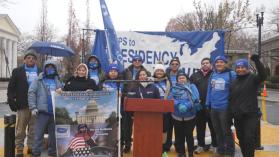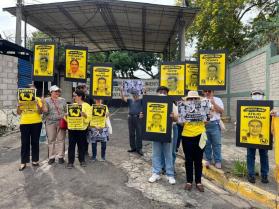Talking Points: Why the U.S. Congress should NOT fund the ILEA OR the Merida Initiative
(more information at www.cispes.org/ilea)
* Money for Central America through the Merida Initiative would mark a significantincrease in funding for equipment and training in the region. CentralAmericas has become the satellite for U.S.military and police training in Latin America,despite its poor human rights record. With the opening of the International Law Enforcement Academy (ILEA) in 2005, El Salvadoralreadythe second largest recipient of military training in the regionbecame the hubof police training. The ILEA has the capacity to train 1500 students per year,more than the current Western Hemisphere Institute for Security andCooperation, also known as the SOA. U.S. officials refuse toacknowledge the corruption, misconduct and human rights violations committed bythe Salvadoran police, and continue to support them through explicit statementsand by sponsoring program like the Merida Initiative and the ILEA.
* Central American governments have used iron fist andanti-terrorism laws to target social movement organizing. The Salvadoranright wing passed an anti-terrorism law in September 2006, followed by ananti-organized crime law later that year. The language in these new lawslikethe Mano Dura laws implemented inother Central American countriesis very vague, leaving them open tointerpretation and a wide variety of applications. The government has used this to furthercriminalize protest tactics commonly used by social movements. The US Ambassador to El Salvador hasexpressed explicit support for police crack-downs, condoning the use ofpolice force in protecting UStrade interests. The Merida Initiative,which funds the ILEA along with other forms of police training in CentralAmerica, would justify such crack-downs and not provide the kindof training Salvadoran police need.
* US programs like the Merida Initiative and theILEA lack oversight and transparency. Congress has not been given sufficient information aboutthe Merida Initiative and the activities of the ILEA. Human rights groups that have sought tomonitor the ILEA have been denied basic documentation, such as coursedescriptions and names of students and instructors. Though backers of the ILEA promise that onlycivilians would be trained there, in fact the agreement leaves the possibilityof military training open.
* El Salvadorand Guatemala, the top twoCentral American recipients of aid from the Merida Initiative, are working to militarizetheir police forces. The separation between police and military in El Salvador has declined dramatically sinceoriginally established by Peace Accords in El Salvador. It is now common tohave groups of soldiers patrolling rural and urban neighborhoods in El Salvador. El SalvadorsNational Civilian Police (PNC) was created by the 1992 Peace Accords to do thework of law enforcement in El Salvadorbut has increasingly been used to violently repress protests in El Salvador,especially protests against unpopular US-imposed policies like CAFTA and waterprivatization. Meanwhile, a resurgence of death squad-style threats and murders in El Salvador hasoccurred since the arrival of the San Salvador ILEA in 2005. The ILEA has done nothing to remedy thecentral problem of high-up corruption and links to death squads within the policeand military, and nor would the Merida Initiative.

 "I am a CISPES supporter because continuing to fight for social justice and a more people-centered country means continuing the dream and sacrifice of thousands of my fellow Salvadorans who died for that vision.” - Padre Carlos, New York City
"I am a CISPES supporter because continuing to fight for social justice and a more people-centered country means continuing the dream and sacrifice of thousands of my fellow Salvadorans who died for that vision.” - Padre Carlos, New York City

